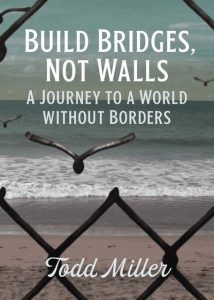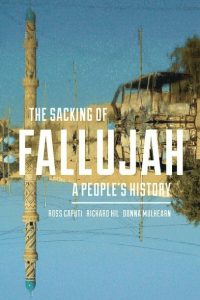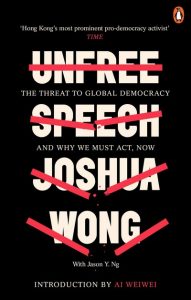Book Reviews
No Borders
 Build Bridges Not Walls. A Journey To A World Without Borders. By Todd Miller, City Lights Books, 2021. 161pp.
Build Bridges Not Walls. A Journey To A World Without Borders. By Todd Miller, City Lights Books, 2021. 161pp.
A book about a world without borders is always going to be one that interests socialists who themselves envision a borderless, stateless society of free access to all goods and services organised democratically on the basis of each according to ability to each according to need. And in this book, the author establishes his own imaginative credentials from the very first pages by envisioning the world as ‘a land without political boundaries’ which ‘connects us to one another’ and stating his intention to ‘examine the natural inclination of human beings to be empathetic with one another, to forge solidarities with one another, and how such inclinations contrast with the borders that invoke and perpetuate chronic forms of racial and economic injustice’. His book focuses mainly on the way in which the policing of the border between Mexico and the USA creates immense suffering – violence, dehumanisation, early death – for refugees from Central America seeking but being prevented from finding better lives north of that border. But in so doing, it throws off a large number of reflections on how similar borders throughout the world provoke similar suffering and suggests that the abolition of borders ‘could make the world a more sustainable, habitable place for all’.
Both its reflections on the author’s personal experiences in reporting on border zones over many years and its analysis of the political system that dictates and enforces border control constitute a powerful indictment of nationalism and the nation state and the way in which they make life hell for people on the move from one country to another for reasons of war, persecution, crop failure, drought, flood, or just plain old-fashioned poverty. He tellingly makes the point that no such preventions exist for ‘people who are very wealthy’ or for those associated with the capital which flows from one country to another. And he illustrates how governments are prepared to spend massive resources on ‘drones (engineered with locust-like wings and… armed with facial recognition software), high-tech cameras, motion sensors, war technology, night vision goggles and an arsenal of weapons’ to keep out those who nationalist fervour considers politically or economically undesirable. Meanwhile, worldwide, he points out that, according to the United Nations Food and Agriculture Organisation, ‘2.1 billion people suffer from malnutrition’.
So what is to be done? The author makes the point that ‘demanding to abolish the border is as unthinkable to many people today as it once was to ask to abolish slavery’, but that chattel slavery has been (largely) abolished and so we should use our imaginations to try and step over the new frontier he points to. However, it must be said that the abolition of chattel slavery can be seen to have been in the interest of a system – capitalism – that was always going to be more efficient in the more advanced stages of its development by using another kind of slavery, the kind that exists today – wage slavery. Much less likely is it that the abolition of borders will be seen as being in the interest of capitalism and of the national capitalist classes that own the world, since, as the author himself tells us, ‘2,153 billionaires have more money than 4.6 billion people – 60 percent of the world population’. Since the small minority is unlikely to give that up of their own accord, it can only be left to the majority of the other class in society – those who sell their energies for a wage or salary – to make that happen and to bring about the end of the wages system, which will also mean the end of the border system and the nationalism that underlies and sustains it.
So the author is right to say that ‘building such a world [i.e. a borderless world] means imagining a radically different global order than we have now’ and it is heartening that he refers approvingly to the book by Ian Shaw and Marv Waterstone, Wageless Life: a Manifesto for a Future Beyond Capitalism. But after such a powerful set of arguments against the nation state and the system it supports, it is a little disappointing that he does not take those arguments further and make them even more imaginative by openly advocating the abolition not just of borders and states but of money, wages and the whole of the profit system. Instead he seems to remain entrenched in the idea of money as the currency of human interaction (‘The resources are there. The money is simply misdirected’) and to limit himself to advocating arrangements like ‘the bottom-up democracy of the [Mexican] Zapatista movement’. The fact is that, so long as the money and wages system and the profit motive underpinning them continue to exist, it is inconceivable that the competing states supporting their national capitalist classes will be dissolved and their borders taken down. If you stick with that system, you are stuck with the state, and with the plurality of states, in conflict as their political and economic interests rub against one another.
HOWARD MOSS
Info War
 The Sacking of Fallujah: A People’s History by Ross Caputi, Richard Nil, Donna Mulhearn. Massachusetts Press, 2019.
The Sacking of Fallujah: A People’s History by Ross Caputi, Richard Nil, Donna Mulhearn. Massachusetts Press, 2019.
In 2016, the city of Fallujah in Iraq, with a population of around a third of a million, was utterly destroyed. It was the third time that it had been under sustained military assault as a consequence of the United States’ invasion of that country. This book looks not at the military tactical ‘war porn’ side of these pacifications, but at the human cost, and the ways in which power was inflicted on that city.
A large chunk of the book is spent defending the right of the population of Fallujah to take up arms in resistance to the invading forces. It also spends some time distancing them from the fighters of ISIS (according to the authors, although ISIS fighters were present for the third battle of Fallujah, they had interposed themselves in the conflict, rather than the Fallujans particularly seeking to join the cause of the Islamists).
Some of the details of how the US fought in Fallujah are instructive. The first battle of Fallujah was shaped by classic counter-insurgency problems. The US had laid siege to the city, creating the prospect of a humanitarian disaster (they also blamed insurgents for using the civilians as human shields, despite the fact that the US themselves had locked them in). Pictures beamed around the world meant the battle was one of propaganda as much as bullets.
This can be illustrated by the fact that as part of the second attack coalition forces took control of the hospital, because they considered the staff there to be ‘terrorist sympathisers’ who put out claims of casualty numbers that conflicted with the coalition’s own announcements. Uncontrolled journalists were barred from the zone. They were determined not to lose the image war a second time.
The book spends a great deal of time discussing information warfare, and the supposed firewall between the psyops and info war that US forces use abroad, as compared to the image management they use at home. Given that they specifically chose to treat independent journalists as a war enemy, it is interesting to note that that was precisely the tactic later adopted by the Trump regime as part of its propaganda operations. It is unlikely, to say the least, that the skills and techniques of info war are unlikely to be brought home, especially when the info warriors get demobbed. They note that one Associated Press photographer ended up being held for two years for unstated ‘security’ reasons.
The second battle involved intense bombardment and house to house fighting. Although civilians had been warned to leave, and many did, it’s thought around 50,000 remained, caught in the crossfire. The authors note that the US soldiers themselves didn’t know much about who they were fighting and why, they simply went into the meat grinder, where many died.
After the second battle, the city was in a ruined state, riven with resentment. The largely Sunni city soon became embroiled in the factional tensions the US (and to an extent Iran) were fomenting in Iraq as part of the ongoing struggle for control of the country post-invasion.
As US forces drew down, the Fallujans rebelled again, and this time their struggle was caught up in the battle against ISIS. It was the turn of the Iraqi government to lay siege to the city, and once again, civilians were forced out into camps, and bullets and bombs laid waste to whatever hadn’t been destroyed in previous assaults.
The clearances of the city, the disruption of services – water, electricity, medicine – were a health crisis within a war. The book deals also with the potential fact that the war has led to ongoing health crises, of high infant mortality, birth defects and cancers. The book is even-handed over the precise cause of these observed trends, but clear that they do exist, and must surely be chalked up to the horrors of modern war being inflicted on that delicate system that is modern urban living.
P.S.
Oaths and Umbrellas
 Unfree Speech: the Threat to Global Democracy and Why We Must Act, Now. By Joshua Wong with Jason Y. Ng: Penguin £9.99.
Unfree Speech: the Threat to Global Democracy and Why We Must Act, Now. By Joshua Wong with Jason Y. Ng: Penguin £9.99.
Joshua Wong was one of the organisers of the democracy demonstrations in Hong Kong, having begun his activism at the age of fifteen in 2011. This book has three parts: his own account of these events, letters he wrote while in prison (half the book, and the least interesting section), and general reflections on the situation in Hong Kong and the state of democracy globally.
Wong was first arrested in 2014, after protesting against changes in the way that candidates for Hong Kong’s Chief Executive could be nominated. A little while later, the Umbrella Movement began, with large numbers protesting and many others handing them free food and water. Wong became ‘a global poster boy for resistance against Communist China’, and in 2017 he co-founded the Demosistō Party, with a programme of self-determination, i.e. that Hong Kong people should decide their own destiny once the transition period after the handover from the UK to China ends in 2047. In 2016 one of their members (not Wong, who was too young to stand) was elected to the Legislative Council. He and a few other council members slightly altered the oath of allegiance they were supposed to swear, and as a result the Chinese government prevented them from taking their seats. The affair is known, of course, as Oathgate.
In 2017 Wong was one of a number of protesters sentenced to prison for unlawful assembly. His sentence was originally one of community service but it was increased to six months’ jail time after an appeal by the government. He has been jailed more than once since, and in May this year, while already in prison for earlier ‘offences’, he was given a further ten months for attending a vigil to mark the Tiananmen crackdown. Others have been charged with rioting and sentenced to six years in prison.
Hong Kong, Wong says, is gradually changing from the rule of law to rule by law, and even a police state, as freedom of assembly and other rights are eroded. The police have become extremely violent against some protesters who wear hard hats and throw bricks at them. The change from British to Chinese rule has just meant being ‘handed from one imperialist master to another’, with young people in particular increasingly describing themselves as Hong Kongers, rather than Chinese.
Wong suggests that Hong Kong is not as important to China as it once was, as cities such as Shanghai have been expanding their role as financial centres. So perhaps it is more trouble than it’s worth. But companies still worry about the economic impact of upsetting the Chinese rulers, and the airline Cathay Pacific sacked a couple of dozen staff for expressing support for protesters. He is aware of the extent of inequality in Hong Kong, but says at one point that all the problems are due to an unaccountable government and a biased electoral system. He sees China as ‘the single biggest threat to global democracy’, and states that the erosion of freedoms there is spreading to the rest of the world. Imprisonment, though, will simply strengthen the resolve of demonstrators, who certainly show a great deal of courage.
PB
